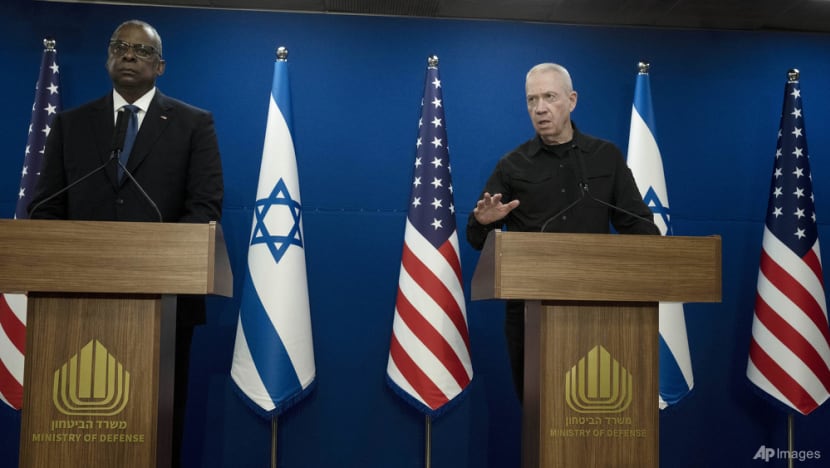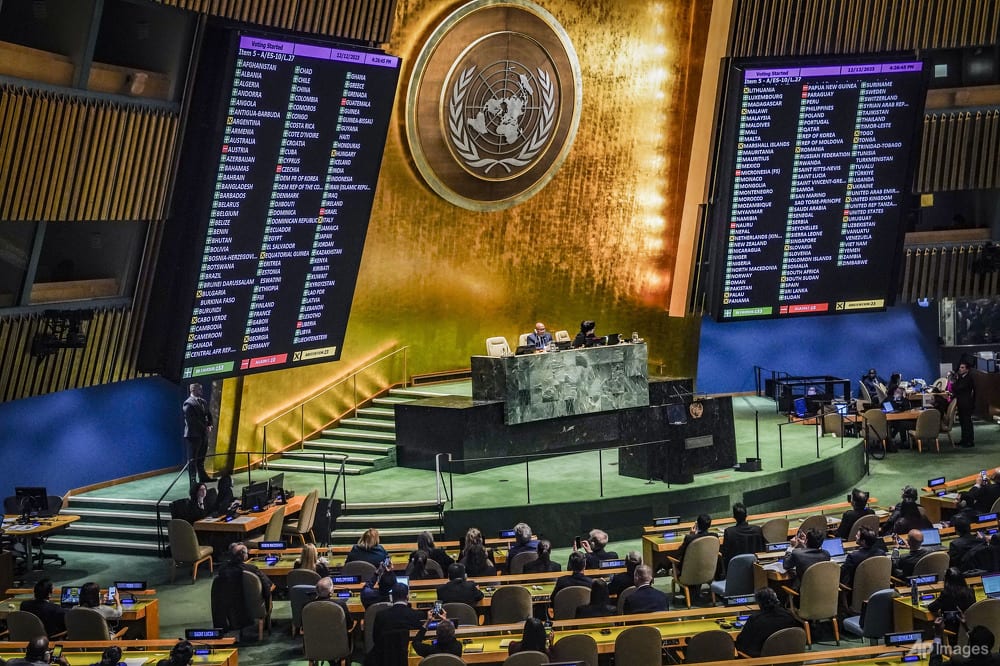Commentary: As Gaza war intensifies, fractures emerge in the US-Israel alliance
Countries that have traditionally and so far, often unconditionally, supported Israel are now very vocal and public in their criticism, says international security expert Stefan Wolff.


This audio is generated by an AI tool.
BIRMINGHAM, England: As the Israeli campaign against Hamas in Gaza shows no signs of slowing down, criticism of it is increasing, notably from Israel’s traditional allies in the West.
Over the weekend, the foreign ministers of Germany, France and the United Kingdom called for stepped-up efforts to achieve a ceasefire.
Their statements were foreshadowed in a warning by United States President Joe Biden last week that Israel was alienating its closest allies over the conduct of its operation in Gaza.
Equally importantly, and reflecting broader Western concerns with Israel’s response to the terrorist attacks by Hamas on Oct 7, there are now also clear public disagreements between the US and Israel over post-war strategy, most notably the future of the two-state solution.
The waning support for Israel is also indicated by a recent vote in the United Nations General Assembly calling for an immediate humanitarian ceasefire in the Gaza war. This non-binding resolution was adopted with 153 votes, with 23 abstentions and 10 votes against.
From the collective West, only the US, Austria, and Czechia voted against the resolution. Among other major allies, the UK and Germany abstained, while France and Canada voted in favour, as did Japan and Australia.

WHY SUPPORT FOR ISRAEL IS WANING
There are several reasons why countries that have traditionally and so far, often unconditionally, supported Israel are now very vocal and public in their criticism.
First among them is the unprecedented suffering of the civilian population in Gaza. What is more, there is a broad consensus, as visible in the vote in the UN General Assembly, that the Israeli government appears to be violating basic norms of international humanitarian law, especially on the protection of civilians in armed conflict.
According to the Hamas-run health ministry, around 20,000 people have been killed and over 52,000 wounded in Gaza in more than two months of warfare. Hamas militants killed 1,200 people and took 240 hostages in the Oct 7 attack on Israel, according to Israeli tallies.
Three hostages held in Gaza by Hamas – presumed to have escaped or been abandoned - were mistakenly shot and killed by Israeli troops on Dec 15 even though they were shirtless and waving a white cloth, sparking outrage over the soldiers’ conduct and the rules of engagement.
The extensive coverage that the Israeli campaign in Gaza has received in the global media makes it all but impossible to turn a blind eye to these violations. It also enables advocacy groups and ordinary citizens to become more engaged and demand action from the politicians that represent them.
This, in turn, provides a powerful incentive to these politicians to act and, above all, be seen to be acting.
A BALANCING ACT FOR JOE BIDEN
With a deeply consequential presidential election in the United States coming up in 2024, this is a particularly difficult balancing act for Mr Biden. It explains, in part, why Mr Biden and advisers close to him, including Secretary of State Antony Blinken, have gone public with their criticism of the Israeli government while still supporting it at the UN.
Notably, the US vetoed what would have been a binding resolution by the UN Security Council calling for an “immediate humanitarian ceasefire” on Dec 8, after it had abstained on an earlier vote on Nov 15 that called for “urgent and extended humanitarian pauses and corridors throughout the Gaza Strip” and an “immediate and unconditional release of all hostages”.
A subsequent meeting of the Security Council was initially scheduled for Dec 18, but then postponed to allow council members more time to discuss a draft resolution. These discussions have so far been inconclusive, as have been separate negotiations brokered by Qatar and the US in Egypt to get Hamas and Israel to agree to a new ceasefire and hostage release.
The difficulty that supporters of Israel face is twofold. On the one hand, there is some consensus beyond the West that Hamas, who are responsible for the attacks against Israel in October that triggered the Israeli government’s disproportionate retaliation, is very much part of the problem and not the solution.
In particular, many Arab governments would like to see Hamas gone. Support for Hamas among Palestinians was low before the current round of violence. Yet, and herein lies the problem, the way in which the Israeli government has responded to Hamas’ violence is likely to drive up support for the organisation and more importantly for what it stands for.
This will make a sustainable solution of the Israeli-Palestinian conflict even harder, which, on the other hand, is further complicated by the fact that there is no longer any consensus between Israel and its allies over what such a solution might look like.
NO CONSENSUS ON SOLUTION FOR ISRAELI-PALESTINIAN CONFLICT
With the current Israeli government now having given up even the pretence of accepting a two-state solution and the United States still firmly committed to it, common ground between them is further diminishing.
Similarly, there is no agreement even on what a short- or mid-term interim solution might look like: The Israeli government appears to favour, among others, a partial reoccupation of Gaza; while the United States and its allies, as well as most countries in the region, seem inclined to give the Palestinian Authority, which currently runs the West Bank, a chance to take over the governance of Gaza, similar to the situation before 2006.
This would not be an easy route either, especially in the face of resistance from the Israeli government, but it would present an opportunity for a more fundamental overhaul of Palestinian governance structures and potentially pave the way towards a more stable two-state solution behind which global opinion could unite.
A united international front, however, is far from certain even for such a minimal consensus. Not only are details on what a two-state solution would amount to in practice sketchy and open to interpretation but there are several spoilers waiting in the wings to torpedo it, including Iran and Russia who both benefit more from continuing violence than sustainable peace.
And even if these spoilers could be managed, long-time and current Israeli Prime Minister Benjamin Netanyahu has long opposed a two-state solution. And the 1988 founding charter of Hamas clearly spells out that there can be no place for two states of Israel and Palestine to coexist peacefully next to each other.
Eventually, the current violence will stop, at least in its present scale. Until then, many more innocent civilians are likely to die, and their suffering will continue well beyond the point when the guns have fallen silent or at least gone quieter. Ultimately, this is a collective failure of leadership, above all in the region itself.
Stefan Wolff is Professor of International Security at the University of Birmingham and Head of the Department of Political Science and International Studies.


















